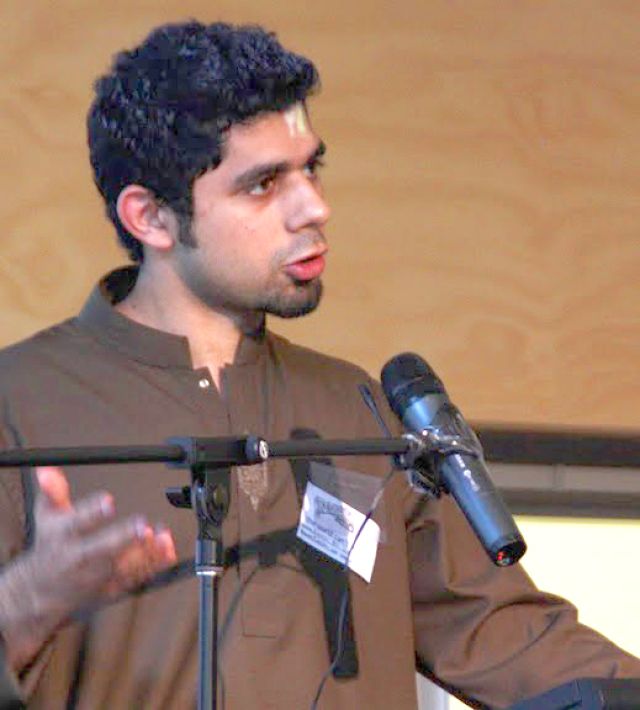
Ammar Ali Jan is a 23-year-old activist in Pakistan who visited Australia earlier this year to speak at the Resistance national conference. He is an organiser of the Progressive Youth Front (PYF), which campaigns for democracy and against corruption. Last week, he spoke to Melanie Barnes from Resistance about what’s been happening in Pakistan, especially the devastating impact of the recent floods.
* * *
Recently you were arrested at a protest against power shortages. Can you tell us about that campaign? What was the outcome of the protest?
On August 10, there was a power outage due to a technical fault. The Water and Power Development Authority (WAPDA) refused to come to fix the problem immediately and said we must wait for a couple of days before the issue was resolved.
The temperatures can rise to 47°C in Lahore. When the situation became unbearable, the PYF decided to rally the locals against the WAPDA administration. About 300 to 400 people joined our demonstration as we blocked the main Feroze Pur road in Lahore, demanding that our electricity be restored immediately.
Soon, heavy police contingents arrived and we started negotiating with them on our demands. While the negotiations were going on, police suddenly started a baton-charge against some of the protesters. We intervened, hoping to diffuse the situation, but we were also ferociously attacked by the police, and they started making arrests.
Five of us were arrested. Our members converged in front of the police station to protest this police high-handedness. What was amusing was that the police station did not have any power either, since it was also connected to the same transformer.
Two hours later, while we were in the police lock-up, electricity was restored and even the police on duty started thanking us, saying it had been restored so quickly only because of our protest.
They also informed us that the reason for such police high-handedness in the middle of our negotiations were the orders from the local parliamentarian who was nervous about the growth of the PYF and wanted to “teach the PYF a lesson”.
We were released on bail the next afternoon and were warmly welcomed by the community.
This protest only helped enhance our standing in the locality and also further strengthened our belief that, in the current scenario, the left can only become relevant if it focuses its energies on transforming specific areas.
The floods have had a devastating impact on millions of people’s lives. What impact have the floods had on politics?
We are now involved in the relief campaign for those affected by the floods in Pakistan. Not only are we raising funds for the victims, but we are also launching a political campaign against the state that has failed to deliver for its citizens.
We are trying to go deeper into the discourse on “natural disasters” that has more to do with the economy of underdevelopment rather than the will of god. For example, the earthquakes in Haiti devastated the entire country, but earthquakes of greater magnitude in Japan, California and New Zealand do not even get noticed.
This can be explained by the peripheral role played by the economies of the Third World under international capitalism since the onset of colonialism.
Colonialism reduced colonised societies to mere spaces for exploitation of resources and cheap labor — something that is still true in the post-colonial world.
We want to highlight some of these structural problems that have reduced the will and means of our state to cater to the wellbeing of ordinary Pakistanis.
The inflated military budget, the lack of social spending and the budget cuts under the instructions of the International Monetary Fund (IMF) and the World Bank, have reduced the capacity of the state to help the 20 million Pakistanis who have been left stranded due to these devastating floods.
How has your organisation responded to the floods? What can people in Australia do to help?
We have launched a full-scale campaign calling for the cancellation of Pakistan’s foreign debt. Eighty percent of Pakistan’s budget is spent either on the military or on the repayment of IMF and World Bank loans.
First, we feel that, considering the current calamity being faced by Pakistan, the debt should be written off on moral grounds, as it would become a great hurdle for the rehabilitation of those affected by the floods.
Second, most of the loans given to Pakistan have been given under military regimes that had no mandate from the people, and were only given to stabilise these US-allied dictatorships.
Third, there has been no audit of these loans; most of the money has been used by the military and civilian elites to increase their wealth. Hence the people of Pakistan cannot be held accountable for such loans, which had a political agenda for keeping the country subservient to the wishes of global capital.
The IMF and World Bank have also forced the government to increase the General Sales Tax on essential items, to privatise public sector companies and to lay-off workers to balance the budget.
Hence while loans are being given to Pakistan and are being enjoyed by our elites, it is the working people who pay for them.
It is for these reasons that we believe the campaign to cancel Pakistan’s debts will become popular throughout the country.
We also ask for solidarity on this issue from our comrades around the world and ask them to pressure their governments to write off Pakistan’s external debt.
[Donation to the Labour Relief Committee to assist with grassroots flood relief.]
